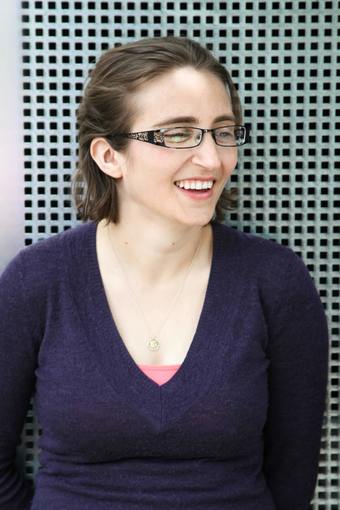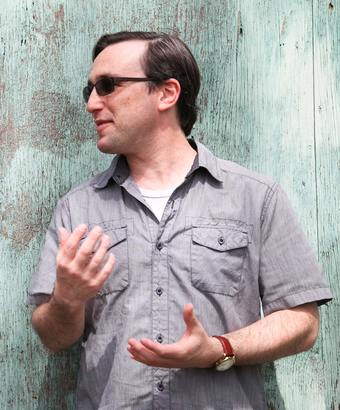Bridging the digital-human language divide: UCSC grads
About six months after completing a master’s degree thesis about Turkish language patterns, UC Santa Cruz graduate Brianna Kaufman was an analytical linguist, helping engineers place quality ads in the right place for tech giant Google.
Kaufman, 25 and a 2014 alumna, is one of a growing number of linguists with a UC Santa Cruz education who have found a niche in the tech world navigating the wide chasm between evolving human and digital languages. They are tackling questions on the frontiers of technology, bridging the distances between human speech and digital communication.
“I really like solving puzzles,” she said.
Kaufman measures the quality of advertisements by gathering data around the relevance of online ad placement. For example, if someone searches online for a lock, is it effective to place ads for a Wal-Mart door lock, keys, or a locksmith?
“In designing tasks for human evaluators, you might explore different task designs and determine if they’re on the right track,” Kaufman said.
She describes Google as a place that pushes “you to think really hard about apparently simple questions, and explore approaches to find the answer. It’s really nice having a new challenge every day when I come to work.”

In another department at the tech giant is Clara Sherley-Appel, 32, who holds a master’s degree in linguistics from UC Santa Cruz. Since graduation, she has worked at a small Silicon Valley tech startup where she used language to help people understand and enjoy products. In June, she’ll join her fellow UC Santa Cruz linguists at Google as a UX writer.
“Since I work with words, having a background in linguistics gives me a way of understanding what words mean to users in their everyday lives and how they actually use language,” she said. “It helps me be clear when talking to users.”
The user experience is about psychological ergonomics, she said, borrowing a term that refers to the growing body of science around human cognition and preferences in design. In her work for Symphony, she created user instructions and the text on buttons that people see when they accomplish a task.
Language matters, but so does design and part of Sherley-Appel’s job was to research and test product design. She collaborated with user experience designers to understand how people look for information and how they use it on the screen.
“It’s really informed by doing fieldwork and the experience I had in linguistics at UCSC,” Sherley-Appel said. “The linguistic research helped me understand how to ask questions. Linguists are interested in how people communicate, how two people can interpret the same sentence differently. Those questions drive your research.”
In the Linguistics Department at UC Santa Cruz, the focus is on investigation, discovery, and critical thinking. Students “learn to stop looking for the right answer and start investigating on the basis of what works and on bigger principles like parsimony and elegance,” Sherley-Appel says.
“Rather than telling students this is wrong or right, at UCSC undergraduate linguistics majors live with those multiple theories side by side until they can come up with a solid justification for choosing one over the other. This constant interrogation of what you’re doing and why is really useful in any job.”
No matter how esoteric or niche your work may become, you still have a facility to communicate with every day people, she adds.
Emulating and interpreting human language, however, has proved elusive.

“We’re not anywhere near the point where computers understand language,” said Jesse Saba Kirchner, 34, who graduated in 2010 with a doctorate in linguistics. “OK Google and Siri (automated assistants that recognize speech) have come a long way. Usually it works. It gets the words right. But, if you try to have a conversation, it usually falls apart pretty quickly.”
Kirchner, another analytical linguist at Google, works in the Mountain View office where he focuses on the field of natural language processing, the broad area of human-computer interaction. He helps engineers create software that can “understand” what a person means when, for example, someone drops or substitutes words in queries and documents. It’s a job that calls on his knowledge of language structure and idiosyncratic language patterns, as well as his problem-solving skills.
“Google’s mission is to make information accessible and useful,” Kirchner says. “That drives a lot of the work that we do.” The task requires enormous amounts of data to anticipate or interpret meaning and human intent. “We really want to make it possible for people to have interactions with the system that are more what you would have with a person rather than talking to a robot,” Kirchner says. “You’re always trying to put yourself out of a job.”
Until that day, however, linguists are drawn to tech careers to grapple with emerging and cutting-edge questions that affect all of us.
“The value we have is bringing that different perspective,” Kirchner says. “We have different tools for analyzing things and problem-solving.”
In his spare time, Kirchner works to preserve endangered languages, a passion that has led him to interview and record people about several languages native to North America. Kirchner also got to work on the design of a new keyboard for the New York-based Seneca Nation of Indians.
“It’s a very exciting field,” Kirchner said. “It’s great to have the opportunity to work on problems that people haven’t solved yet, to improve the situation and really make things that are useful for users, maybe help things be a little easier.”
Sherley-Appel agrees. “I really like doing something that has that wider reach where I feel like I’m helping people a little every day. When I can look at the results of user testing and see that this sentence I wrote is helping people understand what they’re doing better than they were before, it gives me satisfaction.”
